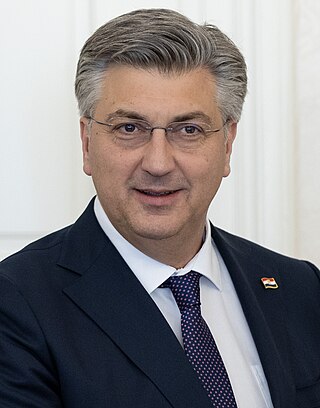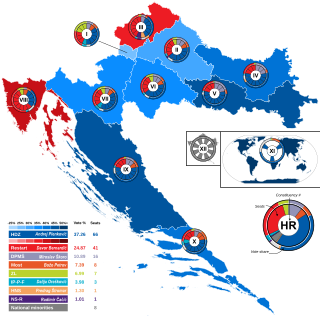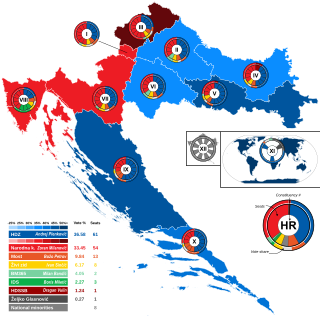This article needs additional citations for verification .(June 2023) |
This is a list of prime ministers of Croatia since the first multi-party elections in 1990 ranked by the length of their combined terms in office.
This article needs additional citations for verification .(June 2023) |
This is a list of prime ministers of Croatia since the first multi-party elections in 1990 ranked by the length of their combined terms in office.






Political parties: Croatian Democratic Union Social Democratic Party Independent
| Prime Minister | Incumbency | Years in power | Number of mandates | Notes | |
|---|---|---|---|---|---|
| 1 | Andrej Plenković (incumbent) | 7 years, 244 days | 2016–present | 1 minority | Plenković served one full term and is currently serving a second term. He has headed two cabinets, with both of them being minority coalition governments (2016–2020 and since 2020). Plenković is the longest-serving prime minister of Croatia. |
| 2 | Ivo Sanader | 5 years, 195 days | 2003–2009 | 2 minority & 1 majority | Sanader served one full term at the head of a minority government and one short term as the head of a majority government. He resigned during his second term. Jadranka Kosor served out the remainder of his second term. |
| 3 | Zlatko Mateša | 4 years, 81 days | 1995–2000 | 1 majority | Mateša served one full term. His cabinet has the single longest duration of any Croatian government since first multi-party elections in 1990. |
| 4 | Zoran Milanović | 4 years, 30 days | 2011–2016 | 1 majority | Milanović served one full term heading a majority coalition government. |
| 5 | Ivica Račan | 3 years, 330 days | 2000–2003 | 2 majority | Račan served one full term. He headed two cabinets: at first a six-party majority coalition (2000–2002) and then a five-party majority coalition (2002–2003). |
| 6 | Nikica Valentić | 2 years, 218 days | 1993–1995 | none | Valentić served out the term of Hrvoje Šarinić. He never won an election in his own right. |
| 7 | Jadranka Kosor | 2 years, 170 days | 2009–2011 | none | Jadranka Kosor served out the remainder of Ivo Sanader's second term. She never won an election in her own right. |
| 8 | Franjo Gregurić | 1 year, 26 days | 1991–1992 | none | Gregurić was the second of two Prime Ministers to serve out the term of Stjepan Mesić. He headed a National Unity Government at the beginning of the Croatian War of Independence and had the parliamentary support of almost all parties. He never won an election in his own right. |
| 9 | Josip Manolić | 327 days | 1990–1991 | none | Manolić was the first of two Prime Ministers to serve out the remainder of the term of Stjepan Mesić, who had resigned to take up a seat in the Federal Presidency (Croatia did not formally declared independence until 25 June 1991). Manolić never won an election in his own right. He was succeeded by Franjo Gregurić. |
| 10 | Tihomir Orešković | 271 days | 2016 | 1 minority | Orešković served one short full term heading a minority coalition government. |
| 11 | Hrvoje Šarinić | 234 days | 1992–1993 | 1 majority | Šarinić served one term heading a majority government. Nikica Valentić served out the remainder of the term until the next election. |
| 12 | Stjepan Mesić | 86 days | 1990 | 1 majority | Mesić served one short term. He was elected Prime Minister by Parliament following the first multi-party election in 1990 (when Croatia was still part of Yugoslavia) and resigned to take up SR Croatia's seat in the Federal Presidency of Yugoslavia in Belgrade. The remaining 2 years of his term were served out by Josip Manolić and Franjo Gregurić. |
Andrej Plenković took office as prime minister on 19 October 2016. On 4 May 2022, he surpassed the tenure of Ivo Sanader (5 years, 195 days) and became the longest-serving prime minister of Croatia since the first multi-party elections in 1990 and independence on 25 June 1991. [1] [2] [3]
If he were to continuously hold the office until:

The prime minister of Croatia, officially the president of the government of the Republic of Croatia, is Croatia's head of government, and is de facto the most powerful and influential state officeholder in the Croatian system of government. Following the first-time establishment of the office in 1945, the 1990–2000 semi-presidential period is the only exception where the president of Croatia held de facto executive authority. In the formal Croatian order of precedence, however, the position of prime minister is the third highest state office, after the president of the Republic and the speaker of the Parliament.

Ivo Sanader is a Croatian former politician who served as Prime Minister of Croatia from 2003 to 2009. He is currently serving a prison sentence for corruption in Remetinec prison.

The Croatian Democratic Union is a major conservative, centre-right political party in Croatia. Since 2016, it has been the ruling political party in Croatia under the incumbent Prime Minister Andrej Plenković. It is one of the two major contemporary political parties in Croatia, along with the centre-left Social Democratic Party (SDP). It is currently the largest party in the Sabor with 62 seats. The HDZ governed Croatia from 1990 before the country gained independence from Yugoslavia until 2000 and, in coalition with junior partners, from 2003 to 2011, and since 2016.
The Government of Croatia, formally the Government of the Republic of Croatia, commonly abbreviated to Croatian Government, is the main executive branch of government in Croatia. It is led by the president of the Government, informally abbreviated to premier or prime minister. The prime minister is nominated by the president of the Republic from among those candidates who enjoy majority support in the Croatian Parliament ; the candidate is then chosen by the Parliament. There are 20 other government members, serving as deputy prime ministers, government ministers or both; they are chosen by the prime minister and confirmed by the Parliament. The Government of the Republic of Croatia exercises its executive powers in conformity with the Croatian Constitution and legislation enacted by the Croatian Parliament. The current government is led by Prime Minister Andrej Plenković.

Zoran Milanović is a Croatian politician serving as the president of Croatia since 2020. Prior to assuming the presidency, he was prime minister of Croatia from 2011 to 2016, as well as president of the Social Democratic Party (SDP) from 2007 to 2016.

Gordan Jandroković is a Croatian diplomat and politician serving as Speaker of the Croatian Parliament since 2017. He previously served as Minister of Foreign Affairs and European Integration from 2008 to 2011, and as Deputy Prime Minister from 2010 to 2011 in the cabinets of prime ministers Ivo Sanader and Jadranka Kosor.

Tomislav Karamarko is a Croatian politician who served as First Deputy Prime Minister of Croatia from January to June 2016. He served in the Cabinet of Jadranka Kosor as Minister of the Interior from 2008 to 2011.

Rivers of Justice is a centre-left political alliance in Croatia. Gathered around the Social Democratic Party of Croatia (SDP), the coalition was originally formed in 2010 as the Kukuriku coalition. This somewhat facetious name meaning 'cock-a-doodle-doo', taken from a restaurant of the same name in Kastav where the coalition leaders first convened in July 2009, became well known and was eventually taken as the coalition's official name. The coalition originally consisted of four centrist and centre-left parties in the Croatian Parliament: the Social Democratic Party of Croatia (SDP), Croatian People's Party – Liberal Democrats (HNS-LD), Croatian Party of Pensioners (HSU) and Istrian Democratic Assembly (IDS). The coalition won an absolute majority of seats in the 2011 parliamentary election and successfully formed a government led by Zoran Milanović (SDP).

Andrej Plenković is a Croatian politician who has been serving as the prime minister of Croatia since 19 October 2016. He was previously one of eleven Croatian members of the European Parliament, serving from Croatia's accession to the European Union in 2013 until his resignation as MEP when he took office as prime minister. Plenković has also been serving as the president of the Croatian Democratic Union since 2016.
The deputy prime minister of Croatia is the official deputy of the Prime Minister of Croatia. Article 109 of the Constitution of Croatia states that the cabinet is to be made up of the Prime Minister, one or more deputy prime ministers and other cabinet ministers. According to convention, if the governing parliamentary majority is a coalition of parties, all junior partners in the coalition will usually be given one deputy prime minister in the cabinet, with their rank usually being determined by the number of MPs the party has in Parliament. The deputy prime ministers are permitted to simultaneously hold a ministerial portfolio while in office, but may also serve without holding such a portfolio.

Božo Petrov is a Croatian politician and psychiatrist who served as Speaker of the Croatian Parliament from 2016 to 2017. He has been the president of The Bridge party since 2012.

Parliamentary elections were held in Croatia on 5 July 2020. They were the tenth parliamentary elections since the first multi-party elections in 1990 and elected the 151 members of the Croatian Parliament. 140 Members of Parliament were elected from geographical electoral districts in Croatia, three MPs were chosen by the Croatian diaspora and eight MPs came from the ranks of citizens registered as belonging to any of the 22 constitutionally recognized national minorities.

The Thirteenth Government of the Republic of Croatia was the Croatian Government cabinet led by Prime Minister Tihomir Orešković. It was the government cabinet of Croatia between 22 January until 19 October 2016. It was formed following the 2015 election. The negotiation process leading to its formation was the longest in Croatian history, totaling at a record 76 days. On 16 June 2016, Orešković's government lost a motion of no confidence in the Parliament with 125 MPs voting for, 15 against and 2 abstaining. As a result, the Orešković cabinet served in an acting capacity until a new government took office after the 2016 election.

Parliamentary elections were held in Croatia on 11 September 2016, with all 151 seats in the Croatian Parliament up for election. The elections were preceded by a successful motion of no confidence against Prime Minister Tihomir Orešković and his cabinet on 16 June 2016, with 125 MPs voting in favour of the proposal. A subsequent attempt by the Patriotic Coalition to form a new parliamentary majority, with Minister of Finance Zdravko Marić as Prime Minister, failed and the Parliament voted to dissolve itself on 20 June 2016. The dissolution took effect on 15 July 2016, which made it possible for President Kolinda Grabar-Kitarović to officially call for elections on 11 September 2016. These were the ninth parliamentary elections since the 1990 multi-party elections.

Predrag Fred Matić is a Croatian centre-left politician of the Social Democratic Party who has been serving as a Member of European Parliament since 2019. He previously served as Minister of Veterans' Affairs from 2011 to 2016, in the Cabinet of Zoran Milanović.

The Fifteenth Government of the Republic of Croatia was the Croatian Government cabinet formed on 23 July 2020, following the 2020 election. It was led by Prime Minister Andrej Plenković. The cabinet was dissolved on 17 May 2024 and was succeeded by a new government presided over by Plenković for the third consecutive time.

The 2020 Zagreb shooting, commonly referred to as the St. Mark's Square attack, occurred on 12 October 2020 in Zagreb, Croatia, when 22-year-old Danijel Bezuk approached Banski dvori, which houses the office of the Prime Minister and serves as the meeting place of the government, on St. Mark's Square and started shooting at it with an assault rifle, wounding a police officer in the process. In the aftermath, the perpetrator ran off to a nearby neighborhood and committed suicide.
{{cite web}}: CS1 maint: numeric names: authors list (link)